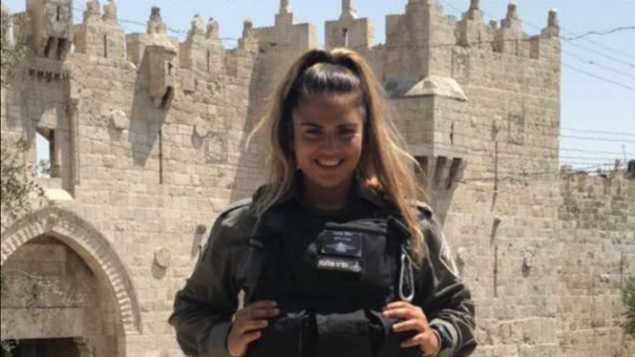Border Police officer Hadas Malka was killed on June 16, 2017 in a stabbing attack near Damascus Gate. (Courtesy)
Hadas Malka, 23, the Border Police officer stabbed to death by a Palestinian assailant in a terror attack outside Jerusalem’s Old City on Friday evening, had sent a final selfie to her friends just minutes before the attack, wishing “Shabbat Shalom to my loving friends.”
Staff Sergeant Malka was a resident of Moshav Givat Ezer in central Israel. She will be laid to rest on Saturday night at midnight in the southern city of Ashdod. She leaves behind parents and five siblings, three sisters and two brothers.
Heartbroken friends on Saturday recalled how they heard about the attack and tried to message her, as they did every time there was an incident in Jerusalem where she served, but this time she did not reply.
“I woke up from a nap and my mother told me there had been an attack in Jerusalem. I said how can there have been an attack? She just sent us a message,” Nofar Sarusi told the Ynet news site.
“Every time there was an attack in Jerusalem I would SMS her to see if she was okay and she would answer,” Sarusi said. “Yesterday she simply didn’t answer.”
The friends spoke of how Malka had been in the navy, but wanted to be a combat soldier and transferred to the Border Police where she did the rest of her mandatory military service and then extended it 15 months ago and became an officer.

They also recounted how she had never been afraid, despite all the attacks that have occurred in and near the Old City in Jerusalem, where she was on duty. “No one will come approach me … They won’t dare even come close to me,” she would tell them, according to Ynet.
Amit Azulai, a friend of Malka’s, told Channel 22 that she was “a true Wonder Woman… good-hearted and optimistic.”

The selfie sent by slain Border Police officer Hadas Malka to friends minutes before she was killed (Courtesy)
Over the past 18 months the Old City, and the Damascus Gate area in particular, have seen several attacks by Palestinians, and in one case a Jordanian national.
Since September 2015, mainly Palestinian assailants have killed 43 Israelis, two visiting Americans and a British student, mainly in stabbing, shooting and vehicular attacks. In that time, some 250 Palestinians were killed by Israeli fire, a majority of them attackers, according to authorities.
Malka was critically injured in the stabbing attack on Sultan Suleiman Street near Damascus Gate on Friday evening. She was transferred to Hadassah Hospital Mount Scopus in Jerusalem where she underwent emergency surgery but later succumbed to her injuries.
She fought her attacker for several seconds while attempting to draw her weapon, according to a Border Police statement. Nearby troops shot and killed the assailant.

Israeli security forces at the scene of a terror attack near Damascus Gate in Jerusalem on June 16, 2017. (Yonatan Sindel/Flash90)
According to the Border Police statement, Malka was part of a group of officers responding to sounds of gunfire near their area of patrol close to Damascus Gate, when she was attacked.
The gunfire was coming from an attack seconds earlier in which two assailants attacked Border Police troops with a homemade Carl Gustav sub-machine gun and knives, at Zedakiah’s Cave in the Muslim Quarter. Some reports said the gun used by the attackers jammed, preventing further casualties. The two attackers were killed.
While on her way to the scene, Malka was accosted by a third attacker.
“Hadas fought her attacker for several seconds, while he stabbed her repeatedly and while trying to reach for her weapon,” the statement read.
Nearby troops opened fire and killed the attacker.

A ‘Carl Gustav’ type makeshift rifle used in a terror attack near Jerusalem’s Old City on Friday, June 16 2017. (Israel Police)
At least four more people were injured in the attacks, including another cop. They all sustained light to moderate wounds and were being treated in hospital.
The attack took place as Muslims were marking the end of the third Friday of the fasting month of Ramadan, during which tens of thousands of Palestinians from east Jerusalem and the West Bank attended prayers at the nearby Al-Aqsa mosque compound, Islam’s third-holiest site.
Jerusalem police chief Yoram Halevy said in a briefing with reporters that police suspect they arrived from the West Bank earlier in the day for Ramadan prayers and suggested that at least some of them did not have permits to cross into Israel.
“During Ramadan there are large numbers of (Palestinian) youths who enter without permits, they take advantage of Ramadan to be in Jerusalem,” he told media at the scene of the attack, adding that in some cases “this is what we get,” in reference to the coordinated attack.
Israel last month announced that it was relaxing restrictions on the movement of Palestinians to and from the West Bank and Gaza Strip during the Muslim holy month of Ramadan, including easier access to the Al-Aqsa Mosque in Jerusalem, issuing more travel permits and allowing some to travel abroad. The measures were similar to those of previous years.




I’ve about had it with the left-wing politicization of the military. To wit: When it comes to serving in combat roles, women are just as capable as men.
This is not meant to signal suppot for politicization by right-wingerst. You know, using the military as a way to shovel tax dollars over to defense firms, create no-bid contract opportunities for politically connected construction firms, ensure control over foreign natural resources and access to their markets, etc.
I’ve about had it with these ‘Wonder Woman’ metaphors.
“Israel Confirms Jerusalem Terrorists Were From PLO, Not ISIS”
By Hana Levi Julian – 24 Sivan 5777 – June 17, 2017″
http://www.jewishpress.com/news/eye-on-palestine/israel-confirms-jerusalem-terrorists-were-from-plo-not-isis/2017/06/17/
There is no peace process. Never was. Never will be. Take everything back. Evict the Arabs. Kill any who resist.